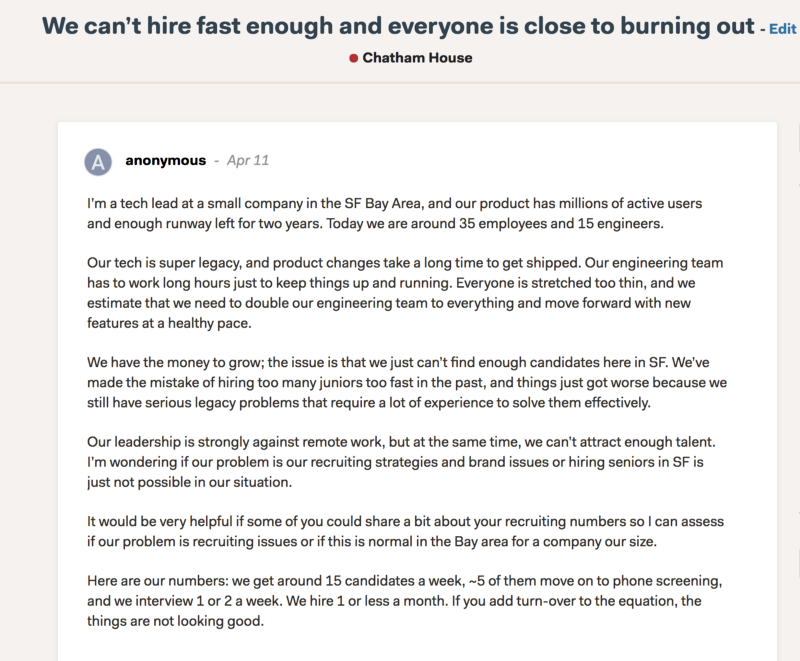What we learned creating an anonymous online forum, “The Chatham House,” for leaders in The Watercooler

Where do you go to talk about the really hard stuff? Sensitive, confidential leadership issues that you don’t really want to be getting out to the rest of your company, let alone the rest of the public?
A few months ago, our CTO at Know Your Team Daniel Lopes and I were talking about this. How it’s hard to have a candid conversation to get advice on truly troubling leadership situations: Your company is running out of money, someone on your leadership team was caught stealing from the company, or you think you need to fire your co-founder.
When we’re faced with situations like this, we usually seek out a few close, trusted advisors or mentors who’ve helped us throughout the years. But sometimes their advice isn’t quite enough. Or, you can’t get ahold of them when you need to. Or sometimes, you don’t even have a mentor or advisor with quite the expertise you’re looking for.
It’s why we created The Watercooler back in October, in the first place — to give leaders a place to have conversations like this online.
But when it comes to the sensitive, confidential stuff — firing, financials, failings — there’s just some stuff you can’t really post in an online community…
Or can you?
With the importance of these sensitive leadership issues weighing on our minds, Daniel and I decided to try it: What if we could somehow facilitate confidential leadership conversations online.
We decided to create a new section of The Watercooler called “Chatham House.” It’d be a safe place to discuss sensitive topics that require total privacy and anonymity on all parts.
The rule would be simple: “Participants are free to use the information received, but neither the identity nor the affiliation of the speaker(s), nor that of any other participant, may be revealed.”
Going into it, I had some big concerns about putting this conversation online, especially about making the conversations anonymous. First of all, would people actually we willing to be honest, even if they were anonymous? A big reason The Watercooler had been working so well to begin with is because folks are identified by name, we ask them to fill out a robust profile, and there’s some baseline of trust that’s established because of it. Would that sense of trust and connection be lost if we made things anonymous?
And of course, the other big fear I had with an anonymous section on our online leadership community was if we’d be inviting inflammatory posts or trolls. We all know how the internet works: If you’re anonymous, you say whatever the hell you want. Accountability goes out the window. Yes, we’d moderate the forum, and yes, we have a strict application process so the quality of the members themselves seem to be high… But , you never really know. And with 700 people and counting in our community, that people might write something ridiculous felt probable.
Despite these fears, I felt like it was worth trying. These conversations are too significant not to be had. If we didn’t at least try to give them a space, where would they go?
So we created the “Chatham House” discussion forum. And, based on our own conversations with tens of managers who’d approached us with some of their confidential leadership issues, we wrote a few posts ourselves on different difficult, sensitive scenarios they’d faced.
Here’s an example:

The result intrigued me. Just a few minutes after the first scenarios went up, we had members offering helpful advice. And then a few hours later, someone else posted their own sensitive, confidential issue to the conversation.
Today, we have tens of conversations and threads in the Chatham House on topics like confronting an executive team member, burning out, a dispute between leaders, not being able to hire fast enough, and more.
Members have reached out to me personally saying how helpful it was to have this forum there. For them, it’s validating to know that people are going through these issues to begin with. One person even wrote to me: “It’s like therapy.”
The release, catharsis, not to mention the resolution of some of these issues, has been pretty remarkable to see.
In hindsight, for us, it seems to have worked as an anonymous online discussion forum for a few reasons:
- We have a strict application process to join The Watercooler — so no trolls (yet!). I think this has been the biggest contributor to why we haven’t had an inflammatory posts shared in The Chatham House discussion forum.
- We set clear expectations upfront about what the forum entails. In the description, we were specific about how it worked, what was expected, and how folks should participate.
- We “seeded” the forum with examples ahead of time of what kinds of issues should be posted in it. This gives people an example of what they can model for telling their own story. It also gives them something to respond to.
For anyone else who participates or runs their own community — online or in-person —I hope sharing this is helpful. If you’re looking for a way to give folks space to talk about the things that are usually off-limits to talk about, this is one way we’ve found to do it.
You might also enjoy reading…




